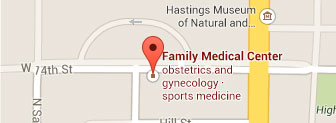Cancer Screening
Family Medical Center of Hastings provides screening tools for several types of cancers. We can screen for lung, breast, colon, cervical and some hereditary cancers.
Lung cancer: The criteria to see if you qualify for this screening test are as follows:
- between the ages of 55-74
- 30-pack year smoking history
- 1 pack per day for 30 years
- 2 packs per day for 15 years
- 3 packs per day for 10 year
- If former smoker, must have quit within the past 15 years
The best way to prevent lung cancer is to catch it in its early stages before it has spread. This is performed by having a CT scan of the lungs.
Breast cancer: We offer mammography and ultrasound testing to help aide in the early detection of breast cancer. We have the equipment to perform these two tests right here in our office. The screening process usually starts at the age of 40 years of age. However, if you have a family history of breast cancer, your health care provider may recommend that you start the screening process earlier.
Colon cancer: Screening starts at the age of 50 years of age. It could start earlier if there is a known family history. Dr. Schram is able to provide this test for our patients. The procedure can either be performed at Hastings Surgical Center or at Mary Lanning Healthcare. You will need to schedule a Colonoscopy Consult with Dr. Schram for this test.
Cervical cancer: Cervical cancer screening process starts at the age of 21 when you begin to have a baseline pap smear exam.
Hereditary cancer: a new cancer screening tool that we are using is called Myriad My Risk Hereditary Cancer. This type of test will screen for 8 different types of cancer: breast, ovarian, colon, uterine, melanoma, pancreatic, gastric and prostate. It will give the probability of your chances of being diagnosed with this type of cancer and what treatments or how often you should have testing done to lessen your chances of becoming a victim of cancer. It is a simple blood test that is sent out to be analyzed by specialists. Results are usually back in 6-8 weeks. Managing your hereditary cancer risk can be done by increasing surveillance thru close and continuous observation and testing, chemoprevention unto which the use of drugs to prevent the development of cancer and risk reducing surgery (based on individual considerations, surgical considerations may be recommended).

If you meet any of the criteria above or if you are interested in having any of these screening tests performed, ask your health care provider how you can get signed up.
